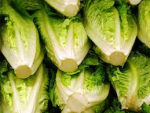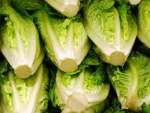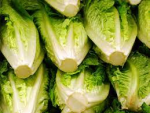Sicario
The Executor
Scientists Are Attempting to Grow COVID Vaccine-Filled Spinach, Lettuce, Edible Plants To Replace COVID Injections
By Alicia Powe

 www.thegatewaypundit.com
www.thegatewaypundit.com
Millions of people who have refused to get an experimental mRNA vaccine may soon be forced to consume the gene therapy in their food.
Researchers at the University of California were awarded a $500,000 grant from the National Science Foundation developing technology that infuses experimental mRNA Covid-19 vaccines into spinach, lettuce and other edible plants.
The team of nanobiotechnology experts is currently working on successfully delivering DNA containing mRNA BioNTech technology into chloroplasts, the part of the plants that instruct its cells’ DNA to replicate the vaccine material.
The researchers are tasked with demonstrating the genetically modified plants can produce enough mRNA to replace Covid jabs and infuse the plants with the right dosage required to eat to replace vaccines.
Experimental mRNA vaccines will be edible, Juan Pablo Giraldo, an associate professor in UCR’s Department of Botany and Plant Sciences who is leading the research explained in a press release published by the university on Sept. 16.
“Ideally, a single plant would produce enough mRNA to vaccinate a single person,” Giraldo said. “We are testing this approach with spinach and lettuce and have long-term goals of people growing it in their own gardens,” “Farmers could also eventually grow entire fields of it,” he added.
Effectively delivering the genetic material to a plant’s chloroplast, small organs in plant cells that convert sunlight into energy the plant can use, is critical to rolling out the vaccinated food.
“[Chloroplasts are] tiny, solar-powered factories that produce sugar and other molecules which allow the plant to grow,” Giraldo said. “They’re also an untapped source for making desirable molecules.”
Genetically modifying edible plants with experimental vaccines for public consumption is the culmination of a dream, the associate professor explained.
“One of the reasons I started working in nanotechnology was so I could apply it to plants and create new technology solutions. Not just for food, but for high-value products as well, like pharmaceuticals,” he said.
While previous studies have shown that chloroplasts are unable to express genes that are not a natural part of that plant, Giraldo’s team is sending genetic material inside of a protective casing into plant cells. To accomplish the unprecedented genetic therapy, Giraldo recruited Nicole Steinmetz, a UC San Diego professor of nanoengineering.
Steinmetz is working with Giraldo’s team to utilize nanotechnologies that allow a plant’s chloroplast to be infused with the mRNA vaccine.
“Our idea is to repurpose naturally occurring nanoparticles, namely plant viruses, for gene delivery to plants,” Steinmetz said. “Some engineering goes into this to make the nanoparticles go to the chloroplasts and also to render them non-infectious toward the plants.”
The National Science Foundation additionally granted Giraldo and his colleagues $1.6 million to develop “targeted nitrogen delivery,” technology that uses nanomaterials to deliver nitrogen, a fertilizer, directly to chloroplasts.
Meanwhile, more people are dying from the COVID-19 “vaccine” than any other vaccine in recorded history. According to the CDC’s Vaccine Adverse Event Reporting System, 18,409 people have died from vaccination in 2021, while just 420 people died from vaccination prior to Covid inoculation mandates in 2020.

By Alicia Powe

Scientists Are Growing Covid Vaccine-Filled Spinach, Lettuce, Edible Plants To Replace Covid Injections | The Gateway Pundit | by Alicia Powe
Millions of people who have refused to get an experimental mRNA vaccine may soon be forced to consume the gene therapy in their food.
Millions of people who have refused to get an experimental mRNA vaccine may soon be forced to consume the gene therapy in their food.
Researchers at the University of California were awarded a $500,000 grant from the National Science Foundation developing technology that infuses experimental mRNA Covid-19 vaccines into spinach, lettuce and other edible plants.
The team of nanobiotechnology experts is currently working on successfully delivering DNA containing mRNA BioNTech technology into chloroplasts, the part of the plants that instruct its cells’ DNA to replicate the vaccine material.
The researchers are tasked with demonstrating the genetically modified plants can produce enough mRNA to replace Covid jabs and infuse the plants with the right dosage required to eat to replace vaccines.
Experimental mRNA vaccines will be edible, Juan Pablo Giraldo, an associate professor in UCR’s Department of Botany and Plant Sciences who is leading the research explained in a press release published by the university on Sept. 16.
“Ideally, a single plant would produce enough mRNA to vaccinate a single person,” Giraldo said. “We are testing this approach with spinach and lettuce and have long-term goals of people growing it in their own gardens,” “Farmers could also eventually grow entire fields of it,” he added.
Effectively delivering the genetic material to a plant’s chloroplast, small organs in plant cells that convert sunlight into energy the plant can use, is critical to rolling out the vaccinated food.
“[Chloroplasts are] tiny, solar-powered factories that produce sugar and other molecules which allow the plant to grow,” Giraldo said. “They’re also an untapped source for making desirable molecules.”
Genetically modifying edible plants with experimental vaccines for public consumption is the culmination of a dream, the associate professor explained.
“One of the reasons I started working in nanotechnology was so I could apply it to plants and create new technology solutions. Not just for food, but for high-value products as well, like pharmaceuticals,” he said.
While previous studies have shown that chloroplasts are unable to express genes that are not a natural part of that plant, Giraldo’s team is sending genetic material inside of a protective casing into plant cells. To accomplish the unprecedented genetic therapy, Giraldo recruited Nicole Steinmetz, a UC San Diego professor of nanoengineering.
Steinmetz is working with Giraldo’s team to utilize nanotechnologies that allow a plant’s chloroplast to be infused with the mRNA vaccine.
“Our idea is to repurpose naturally occurring nanoparticles, namely plant viruses, for gene delivery to plants,” Steinmetz said. “Some engineering goes into this to make the nanoparticles go to the chloroplasts and also to render them non-infectious toward the plants.”
The National Science Foundation additionally granted Giraldo and his colleagues $1.6 million to develop “targeted nitrogen delivery,” technology that uses nanomaterials to deliver nitrogen, a fertilizer, directly to chloroplasts.
Meanwhile, more people are dying from the COVID-19 “vaccine” than any other vaccine in recorded history. According to the CDC’s Vaccine Adverse Event Reporting System, 18,409 people have died from vaccination in 2021, while just 420 people died from vaccination prior to Covid inoculation mandates in 2020.







